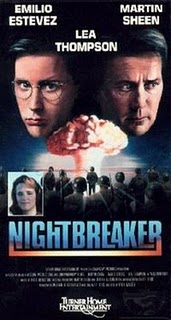
NIGHTBREAKER
US, 1989, 100 minutes, Colour.
Martin Sheen, Emilio Estevez, Melinda Dillon, Lea Thompson, Joe Pantoliano.
Directed by Peter Markle.
Nightbreaker is a telemovie about the nuclear tests in Nevada in 1956 and their repercussions on health and conscience in the 1980s. It was produced by Martin Sheen, who also stars, as does his son Emilio Estevez, who plays the character of Sheen in the 1956 scenes.
The film is a psychological drama as well as a message film. It focuses on a man who was present at the tests and who has achieved eminence in science. He is asked, by ailing veterans, to remember the past.
The film re-creates the atmosphere of Nevada 1956, the eager enthusiasm of the soldiers as well as the participation by ill educated GIs in the atomic tests. There is vivid picturing of the tests and their repercussions.
A serious-minded film - can be seen in connection with Roland Joffe's Fat Man and Little Boy, The Story of Los Alamos, and the Australian film Ground Zero, a thriller using a parallel situation of British testing in Australia.
1. Interesting drama? Message? Relevance?
2. The contribution of Martin Sheen, his interests, social concerns? How persuasive? The original novel called `Atomic Soldiers'?
3. The structure of the film and the moving between the '80s and the '50s? The Las Vegas of the '80s? Nevada of the '50s? Each period? Musical background for the periods?
4. The re-creation of the nuclear sites, the conditions? The blasts, the impact, winds and fall-out? The models and the model homes? The men in the trenches? How vivid the portrayal of the dropping of the bombs? The end credits and the use of authentic footage from the '50s?
5. Alex Brown in the '80s, his achievement, at Las Vegas, the reporters, his skills, the operation, his award? His memories? The arrival of the soldiers and their effect? Discussions with Paula and the truth about sterility? His not wanting to lose his wife? His speech and the implications of the ending?
6. Alex in the '50s: the young whiz kid from the east, his job, the questionnaires and interrogations? His reaction to the soldiers and their answers? Interaction with officials? Applause at the dropping of the bomb? His experience of exhilaration? Meeting Sally, friendship, talking and sharing, her instilling doubts, refusing to open the door because of the fall-out? The effect on him, discussions, the secret files, the clash with authorities and their bickering, the cover-ups? The experience of the blasts? His leaving?
7. Alex and his relationship with the men, the bonds, the questions? Sergeant Jack Russell and sharing with him? The watching of the blasts, the goggles, the distance? Radio-activity and tests? The men affected? The relaxation with the pigs, watching the movies and their turning serious? The men and their ignorance, participating in the tests? Sally not letting them in? Alex and the final confrontation with Jack, the final blast and sheltering behind the rocks?
8. The portrait of the soldiers: young, ignorant, gung-ho, attitudes towards the bomb, Russia, fall-out? Wanting to keep on to their jobs? Their daring? Not realising the reality? The consequences in later decades?
9. The officials, their moods, 1945-62 and the tests, almost 250,000 Americans? The risks taken? The consequences?
10. This film and other movies about the period, about nuclear weapons and warfare? Looking at the past and the critique? The visualising of the '80s protest? The movies as protest?